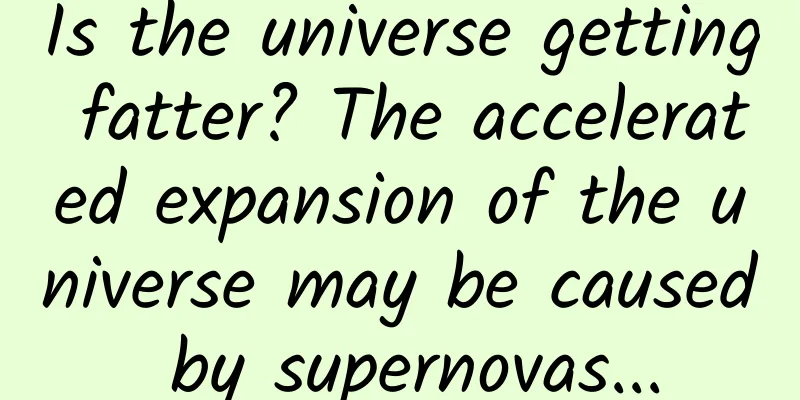Is the universe getting fatter? The accelerated expansion of the universe may be caused by supernovas...

|
In the late 1920s, Edwin Hubble discovered that the recession speed of galaxies is proportional to their distance from the Earth. This is the famous "Hubble's Law", which shows that the universe is not static, but is constantly expanding. This discovery is one of the key evidences for the Big Bang theory. But astronomers have always believed that the expansion of the universe is slowing down. But until the end of the last century, astronomers made an amazing discovery, which shocked the scientific community like a bombshell, that is, the universe is likely to be expanding at an accelerated rate. To explain why the universe is expanding at an accelerating rate, we have to start with "supernovae", or Type Ia supernovae to be exact. They are a special type of supernova whose explosion mechanism causes them to have almost uniform peak luminosity, so they can be used as "standard candles". Astronomers use the distance modulus formula to measure their distance from the Earth by observing the apparent magnitude of Type Ia supernovae at different distances, combined with their known absolute magnitudes. In the late 1990s, two teams tried to refine their estimates of the Hubble constant by observing Type Ia supernovae. The Hubble constant is a key physical quantity that describes the rate of expansion of the universe, which represents the proportional relationship between the recession speed of galaxies and their distance. They originally thought that this study would allow them to see how much faster the universe was expanding in the past than it is now. After all, before this, scientists had agreed that the universe expanded too fast at the beginning of the Big Bang, and gravity had no time to pull it back. In the long years that followed, gravity caught up and kept trying to slow down the expansion. However, when they compared the distant galaxies where Type Ia supernovae are located with similar studies of nearby galaxies, they were surprised. In 1998, the two teams discovered that their observations suggested that the universe expanded more slowly in the distant past. In other words, the universe is expanding faster today than in the past, which we can understand as the universe is expanding at an accelerating rate. According to Hubble's law, the recession speed of galaxies is proportional to their distance from the earth. The recession speed can be determined by the redshift of the galaxy spectrum. The larger the redshift, the faster the galaxy recession speed. In the observation of a large number of supernovae, it was found that the farther the supernova is, the greater its redshift is. The more distant supernovae are dimmer and have a larger redshift than expected, which means that the universe is expanding at an accelerated rate. So what mysterious force is behind the accelerated expansion of the universe? This has become one of the most urgent mysteries in contemporary physics. According to the traditional theory of matter and gravity, that is, according to the known gravity generated by ordinary matter and dark matter, the universe should gradually slow down its expansion under the action of gravity, and may even shrink in the end. Therefore, scientists speculate that there is an unprecedented mysterious energy with anti-gravitational properties, which can overcome the gravitational force between matter and drive the accelerated expansion of the universe. This mysterious energy is named "dark energy." What exactly is dark energy? There is no definitive answer at present. Scientists speculate that it accounts for about 68% of the total mass-energy of the universe. From the current understanding of physics, dark energy is not matter. It is a mysterious form of energy that is fundamentally different from matter. It cannot be directly observed, and its existence can only be indirectly inferred through its impact on the expansion of the universe. Judging from most of the current observational evidence and theoretical models, it is a widely accepted view that the universe is expanding at an accelerated rate, but there are still some uncertainties and controversies. First of all, the methods used to observe the expansion of the universe have certain errors. For example, supernova observations may be affected by interstellar dust, which absorbs and scatters light, thereby changing the brightness of the observed supernova and leading to inaccurate distance estimates. In addition, although the dark energy model can explain the accelerated expansion of the universe, the nature of dark energy remains a huge mystery. Moreover, dark energy has not yet been directly detected, which makes some scientists cautious about the explanation of the accelerated expansion of the universe. Many people may ask, will the universe continue to expand? What will be the ultimate fate of the universe? In fact, the scientific community cannot answer these questions accurately at this stage, and can only give several possibilities for the future of the universe. The most mainstream view at present is that the universe will continue to expand due to the existence of dark energy. If dark energy continues to dominate, the universe will continue to expand at an infinitely accelerated rate. In the distant future, the distance between galaxies will become so far that the gravitational connection between them will be completely cut off. Stars will burn out their fuel one by one and eventually go out, and the universe will fall into endless darkness and cold. This is the so-called "Big Freeze" ending. If the properties of dark energy change unexpectedly, such as its energy density suddenly decaying or changing to a gravitational attraction, the evolution path of the universe will be completely different. It is possible that the universe will return to a decelerated expansion, or even begin to contract, and eventually all matter will gather together again, triggering a "big collapse" opposite to the Big Bang. The universe will return to its initial singularity state, waiting for the next "reincarnation" outbreak. Another more extreme possibility is the "Big Rip", in which the repulsive force of dark energy will become stronger and stronger, eventually tearing apart galaxies, stars, and even atoms, and the universe will completely disintegrate. There are several possibilities for whether the universe will continue to expand, whether it is a "big freeze", "big collapse", or "big rip". These predictions are based on current cosmological theories and observational data, but there is still a lot of uncertainty. With the development of future science, these predictions may change. Since we know almost nothing about dark energy, and some even speculate that dark energy may not exist, we really don’t know whether the universe will continue to expand in the distant future, and where the fate of the universe will go. Perhaps one day, we will be able to solve the mystery of dark energy, and then we may be able to fully understand the nature of cosmic expansion and predict the ultimate fate of the universe. Author: Stars Become Light Reviewer: Li Mingtao, researcher at the National Space Science Center of the Chinese Academy of Sciences Produced by: China Association for Science and Technology Department of Science Popularization Producer: China Science and Technology Press Co., Ltd., Beijing Zhongke Xinghe Culture Media Co., Ltd. |
<<: New study! Even if Helicobacter pylori is eradicated, the risk of gastric cancer still exists!
Recommend
Chicken eggs, duck eggs, quail eggs, which one is more nutritious? How to choose?
Chicken eggs, duck eggs, quail eggs... There are ...
Tesla's "Confidence Guarantee Plan" has been discontinued, and no refunds or exchanges are supported within 7 days of car delivery
Tesla has always greatly reduced the burden of ca...
Why the horse-faced skirt has become the new top trend in the fashion circle? Thousands of years of evolution history will tell you
Contemporary Society Wearing a horse-faced skirt ...
Drinking less alcohol can reduce harm? Many people don’t know this…
Reviewer of this article: Chen Haixu, Deputy Dire...
How to increase the follow-up rate of your official account and encourage users to follow you after reading your articles?
A very stupid question: What is the most basic th...
What are the functions of Foshan Agricultural Products Mini Program? How much does it cost to create an agricultural products mini program mall?
As the country vigorously supports rural economic ...
Why are cases still high as the weather gets warmer? Does temperature affect the activity of the virus?
It is the season of spring again, when flowers bl...
[Latest opening] The latest fluorescent cloud new project, receive unlimited coupons, daily income of 300+
[Latest opening] The latest fluorescent cloud new...
Do you know these 4 points about Tencent social advertising?
Do you know all this about Tencent social adverti...
The hunting suit market is too competitive. The 2025 Song L EV is fully upgraded with more features but no price increase. It starts at 189,800 yuan.
On August 30, the 2024 Chengdu Auto Show official...
E-commerce live streaming practical process summary
The market is very good, but you need to be cauti...
Messi wins the World Cup! It turns out that the 22 players on the field are not playing with the same ball?
Audit expert: Liu Yuhang PhD, Beijing Internation...
"Trimming horse hooves, washing carpets, squeezing blackheads..." Why can't you stop watching these videos?
Produced by: Science Popularization China Author:...
More than 30,000 butts get blown up by toilets every year! Don't do this when you go to the toilet →
Source: Dr. Curious...
Milk is getting harder to drink. Is it my illusion? The truth is...
Today is World Milk Day. Milk and various dairy p...









